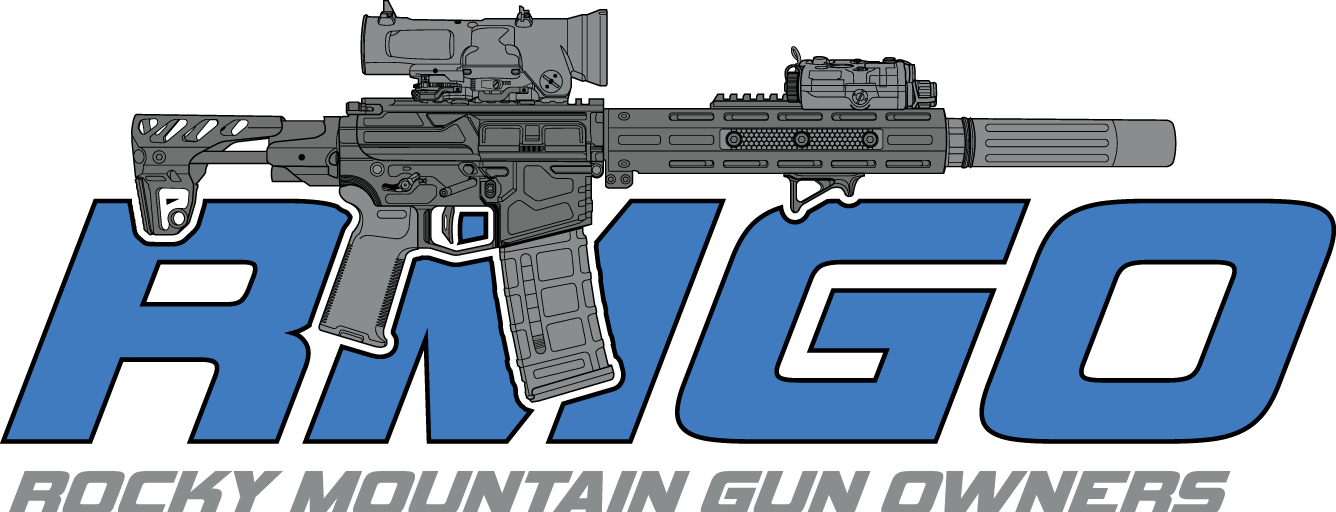Banning Businesses
Welcome to Rocky Mountain Gun Owner’s Merchant Awareness Program, where we do our part to make Colorado safer by educating businesses about the dangers of creating a “Criminal Safezone” in their establishment. Put bluntly, we believe Colorado is a safer place with free, law-abiding citizens carrying firearms. Concealed or open carry, it makes a criminal think twice.
The Merchant Awareness Program is our way of knowing who doesn’t want us to carry in their establishments, and respecting those wishes, while giving them facts so that they might make a more informed decision about self-protection.
Rocky Mountain Gun Owners’ Merchant Awareness Program serves two important functions:
- It is an evolving database of posted merchants that serves notice to permit holders where not to break the law by carrying concealed handguns… it’s a list of merchants who don’t want law-abiding citizens to carry concealed weapons on their premises.
- It serves notice to posted merchants that permit holders, as principled individuals, will not do business where their right to lawful, armed self-defense from violent criminal attack is denied.
When RMGO receives information that a merchant or business dependent on public goodwill is posted, our organization sends a formal letter of protest to that businesses’ owner of record or corporate CEO or president. The letter politely informs the merchant or business that:
- Permit holders have undergone scrutiny by both state and federal law enforcement agencies.
- Merchants who post against concealed carry invite criminal mayhem from individuals looking for easy targets of opportunity.
- Merchants who post against concealed carry have implied assumed responsibility for the safety of their patrons and may face financial redress in the event of a criminal act, which results in injury/death of a patron.
- Gun owners are consumers who represent a valuable commodity.
The name and address of the posted merchant or business is then added to a computer database which you see on this web site and in your newsletter (if you are an RMGO member, that is). If the merchant or business removes their posting signs, the name of that merchant or business is removed from the list of banning businesses. Merchants who do not remove their signs receive a follow-up letter and may also receive ‘extra attention’ in the form of postcard mailings or, if necessary, negative publicity events (picketing). Merchants who are caught cheating also receive extra attention from Rocky Mountain Gun Owners.
Rocky Mountain Gun Owners depends on information gathered from gun owners from around the state. Therefore the information provided RMGO is only as accurate as what is provided us from you, the gun owner. The more information about a posted merchant provided the better.
What do you do when you encounter a merchant or business that is posted against concealed carry? Grumble and walk away? Disarm yourself and spend your hard-earned dollars with a merchant who denies you your right to armed self-defense from societal predators? Or do you turn a problem into an opportunity?
Those businesses who change their policy and begin to allow gun owners in their establishment will not change their minds simply because they received a protest letter from RMGO. Conversely, a letter from RMGO will rarely be sufficient to convince a merchant to stop posting. Merchants stop posting because they receive a steady influx of complaints from the public… their former customers who make good on a promise to do business elsewhere until the posting policy is rescinded.
This program based on similar efforts by North and South Carolina firearms rights groups, who have done this successfully for years. Their experience has taught them what they refer to as “The Rule of Thirds”:
- One third of posted business will immediately rescind a posting policy upon receiving an overview of the benefit of concealed carry as a strong deterrent to violent crime. This overview can come from either a communication by RMGO or a personal visit by a gun owner/permit holder(s).
- One third of posted business will rescind a posting policy in response to a protracted education effort by gun owners/permit holders.
- One third of posted business will refuse to rescind a posting policy no matter what information is presented them.
They’ve learned to write off the last third; it’s the first two-thirds we’d need to concern ourselves with.
Many merchants continue to post because they haven’t been approached by anyone willing to take the time to educate them on why gun owners/permit holders aren’t a problem. If your response to encountering a posted merchant is to turn around and walk away never to return then you shouldn’t expect the merchant to stop posting.
Your first responsibility when making merchant contacts should be to gather information that it may be sent to RMGO for entry into our databases. You can accomplish that by simply getting a card from that business, with the business owner’s name (more on that below) The second task is to present information to the merchant so that a favorable outcome may be reached. Commit this to memory…it will be explained in further detail.
When engaging in merchant contact activities never forget that you are a diplomat for firearms owners and that first impressions are lasting ones. Rude behavior, being too confrontational and other unacceptable behaviors, no matter how rudely one is treated by a merchant, can be counterproductive to our mission.
In a word, everything!
As was mentioned earlier, your primary responsibility when making merchant contacts is to gather information.
BURN THE FOLLOWING INTO YOUR MEMORY:
The most important piece of information RMGO needs is the name of owner of record or corporate CEO or president because they are the ones who have decision-making abilities. It should be your primary goal to get this name above all else.
You can do a search for a business owner by clicking here.
To really change a business’ practice it’s best to deal with the person at the top. It eliminates the temptation by a lower-level employee to “pass the buck”, and a communication to a merchant with the owner’s name on the letter of contact sends a much stronger message than a letter addressed to “Dear Business Owner”. Admit it, did you ever really pay that much attention to a letter you’ve received addressed to “Occupant”? The business’ name is obvious, and getting the address is as simple as opening a telephone book. It’s the owner’s name we need. That way, if things go south, as they sometimes do, RMGO has all the information necessary to forward an official communication. Case in point: a permit holder in South Carolina approached a retailer and immediately launched into the posting issue. The retailer took offense (it happens, they’ll get over it) and told the permit holder to leave the store. When the permit holder asked the retailer for his name, the retailer refused to provide it. Had the permit holder gotten the owner’s name first it would have made things easier in regard to sending a letter to the individual in question.
Despite the fact that we’re the good guys, many people regard the concealed carry issue as extremely controversial. Don’t be surprised if a retailer immediately “tightens up” if the subject is brought forward. It’s a natural response and it’s not worth getting confrontational over. It’s also for this reason that one need not even bring up the subject to a store’s rank-and-file employees when obtaining information; many of these folks have little concept of firearms, self defense, or carrying concealed. Resist the urge to deliver a lecture to the pimply kid at your local Shop-and-Rob… he has no decision-making authority.
For whatever reason, if you cannot get the name of the owner of record or company CEO there are alternative methods of obtaining it:
- Secretary of State records
- Owners business cards (usually in plain sight… get one or two)
- Local chambers of commerce
- City Hall/county records (many cities and counties require business permits; the records are available to the public)
- Social and professional contacts
- Inquiries from a posted merchant’s adjoining business neighbors
- The post office
- Telephone books/yellow pages (just call and ask)
- Inquiries to a posted merchant’s supplying vendors
A merchant who refuses to provide you with his or her name in the belief that withholding such information will prevent their business from being listed on RMGO’s database is doing so blindly. Merchants cannot operate in the public eye under total immunity from public record or scrutiny.
There are as many ways to conduct a merchant visit as there are permit holders to conduct them, so a hard-and-fast formula cannot be provided you. You will simply have to do what works best for you. Some people simply hand the merchant a copy of the newsletter and make a follow up visit at a later date. Others make more formal presentations. Here is a list of Dos and Don’ts for your consideration:
Do…
- Conduct yourself as a professional. Dress appropriately – you don’t need to wear a suit and tie. but hunting attire/BDUs/cammies, dirty clothing, clothing in disrepair, or T-shirts with slogans which could be construed as controversial should be avoided. Present yourself as an ordinary guy or gal. Brush your teeth. Don’t wear sunglasses (they make you appear cold and secretive).
- Determine if the merchant or business is an individually owned proprietorship, a locally owned franchise, or part of a larger chain of stores.
- Recognize if and when you get “the run-around”. “We are required to post by law”, “Our insurance company made us do this”, and “It’s corporate policy” are common brush-off phrases we’ve heard. Learn to anticipate and deal with such claims appropriately. Oftentimes a chain store has been posted per store manager’s discretion.
- Remind the merchant that their present postings bear no legal or practical notice on criminals. Remind the merchant that they are discriminating against customers with proven clean records.
- Ask the specific reason why the merchant is posting.
- Recognize that educating merchants about concealed carry and reluctance to patronize posted businesses is not “harassment”.
Don’t…
- Make threats or get confrontational with a merchant. You’re only likely to get yourself into trouble with law enforcement.
- Remove any postings without express permission.
It is our firm belief that posting issues should be handled by local permit holders working in their own communities to solve posting issues.
If a merchant is unreceptive to a contact you may wish to engage in further contacts by having other permit holders in your area contact the merchant, the idea being if a merchant hears a steady stream of complaints from former customers they’ll unpost (“When they feel the heat, they’ll see the light”). Contact other permit holders in your area. Conduct a ‘phone blitz’ or ‘postcard blitz’ informing the merchant that you will return your business when your safety concerns are met to your satisfaction (RMGO can supply you with postcards…you supply the signatures and stamps).
And finally, learn to recognize when a merchant or business simply wants no part of concealed carry/firearms issues. They will continue to be listed on our database as long as they are posted. If a posted merchant in your area is the scene of a violent crime notify RMGO immediately.
If you volunteer to verify that a merchant or business is no longer posted, recognize the fact that the signs may have simply been moved elsewhere on the premises. You need to do a physical walk-through. Check every entrance inside and out… THOROUGHLY. Ask the owner or management if necessary and don’t forget to thank them. If unposted, return your patronage and let them know why.




